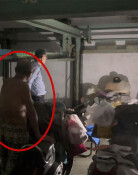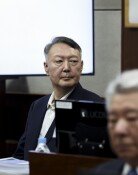No More TV Commercials in November
No More TV Commercials in November
Posted October. 23, 2007 07:29,
The Korean Advertisers Association (KAA) announced yesterday that its members would not buy airtime for advertising purposes next month in protest against the KOBACOs sharp raise of the rates. The KOBACO, or Korea Broadcast Advertising Corporation, is a state-run company with the exclusive license to sell the airwave.
The unprecedented move of the KAA will cause severe turmoil in the coming months.
A KAA official explained yesterday, Our major members including Samsung, Hyundai, SK and LG groups decided last Thursday that they would not run the TV and radio ads in November, should the KOBACO insist on the rate hike.
The official also complained, The state-run corporation has forced us to pay for unsold spots and unpopular radio sponsorships. We will commence legal actions to cure the unfair trade practices.
Our resolution is not legally binding. But our fifty major members including the four groups promise to honor it. Thus, I believe, it will have enormous impacts.
On the other hand, the state-owned company, facing severe opposition and protest, backed down from its original plan and promised to freeze the current rate schedule. It further proposed that it would raise the 2008 rates only and discuss the details later with KAA members.
The KAA, however, brushed away the offer, demanding a complete revocation of any rate hike plan.
To run a TV or radio ad in South Korea, an advertiser has to buy a monthly airwave spot or the regular spot with 6-12 month term from the corporation. Now, monthly spot sales occupy 70 percent of the aggregate ads.
The state-owned company retains the exclusive license to sell the airwave to advertisers. Thus, companies cannot run commercials on TV or radio without first purchasing the spots from the corporation.
KOBACOs recent plan to raise the rates triggered the dispute. Earlier this month, the KOBACO announced that it would raise the price tags for TV and radio sponsorship by 7.9 percent and 5.0 percent on average, respectively.
The KAA angrily responded to the plan. It argues, The KOBACO has constantly raised the rates for various reasons in various forms. For example, it frequently raised the base rates, and charged seasonal premiums to us. The national networks are losing viewers, and we have witnessed the sagging economic impacts. They just raise the rates to dump its deficits on us.
The KAA commands the largest membership consisting of 200 Korean companies, and accounts for 80 percent of the total ad spots sold a year.
larosa@donga.com



![‘딸’ 같아서…상가 담보로 내준 치매부부, 6억 털렸다[히어로콘텐츠/헌트①-下]](https://dimg.donga.com/c/138/175/90/1/wps/NEWS/IMAGE/2025/12/14/132963612.1.jpg)


![“통일교 특검, 장동혁 단식하면 얻는 게 있을수도”[정치를 부탁해]](https://dimg.donga.com/c/138/175/90/1/wps/NEWS/IMAGE/2025/12/15/132969044.1.jpg)
